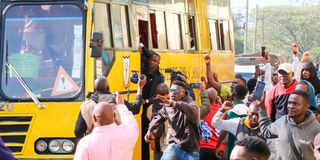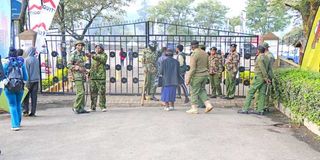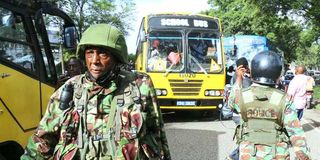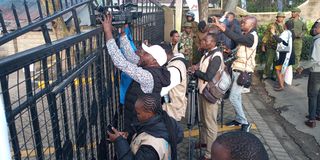
A crowd escort a school bus ferrying Butere Girls’ students from Melvin Jones Academy in Nakuru on April 10, 2025. The learners refused to perform the ‘Echoes of War’ play in the ongoing National Drama and Film Festivals.
What happened during the 63rd Kenya National Drama and Film Festivals in Nakuru on Thursday is heroic and dangerous at the same time.
Butere Girls High School’s walkout of the stage protesting the detention of their play’s director and former Kakamega Senator Cleophas Malala was the first scene in many that would mirror the very themes presented on stage that week.
Using state security apparatus to escort school buses from the venue was ironic, given that the very play in question exposed similar abuse by officials of a fictional country.
The play Echoes of War had satisfied adjudicators in various stages, who saw it fit to proceed to the national level of the drama festival, having secured third place at the Western regional competition.

Anti-riot police officers at Melvin Jones Academy where Butere Girls were to stage their play.
That was until the drama Butere Girls High School drama team was sent home by Chief Principal Jennipher Omondi on unclear grounds.
Ms Anifa Mango, former student of Butere Girls High School and a thespian, filed a petition in court, arguing that the headteacher’s actions violated the students’ rights to freedom of expression and fair administrative action.
Justice Fridah Okwany of the High Court ordered the school to recall the 50 students and facilitate their participation in the festival. The court said the principal’s actions were arbitrary and unconstitutional. Justice Okwany stressed the importance of upholding students’ rights to artistic expression.
The night before their performance, reports of the arrest of Mr Malala made headlines, prompting the girls to protest.
It was not the first time Butere Girls’ drama abilities had put the school in the limelight, and – by coincidence – with the same director.
In 2013, the submission of the school to the festival, Shackles of Doom, was again adjudicated and passed until it reached the nationals in Mombasa.
The Ministry of Education, through the Kenya National Drama Committee, banned the play after deeming it “too political” and containing “divisive elements” that could stir unrest.
It took the intervention of the High Court to reinstate the play, following a petition signed by Mr Okiya Omtatah – now Busia Senator – who argued for the students right to artistic expression.
The Kenya National Drama and Film Festival has been a launch pad for artistic expression, propelling students to national acclaim. Drama has ignited passion for the arts among students, many now seasoned actors. They credit this platform for opening doors.

Anti-riot police escort Butere Girls school bus which was ferrying students along 58 road in Nakuru after they declined to perform their play at Melvine Jones academy on April 10, 2025.
The plays by schools run with themes that mirror current affairs and societal issues like corruption, marginalisation, exploitation by citizens of the political elite and disenfranchisement of communities.
In terms of its themes, Echoes of War was well within the usual fare at the festival. There should have, therefore, been no justifiable reasons for the use of force by government organs towards students, no matter the “dangers” a simple play seemingly posed.
(Here is the full script as presented in court): Go to page 11
In fact, what was supposed to be an attempt at censorship of the play turned out to be the very thing that propelled Kenyans to rally in solidarity with Butere Girls School.
Those who were oblivious to this play have now watched clips of past performances on stage. The full script of Echoes of War has been shared on platforms like WhatsApp with the advisory by some to “read and delete”.
It smells of the days publications deemed seditious such as Pambana in the 1970s, Mwakenya, Beyond, Society, Nairobi Law Monthly in the 1980s and 1990s were smuggled through back doors. Is Kenya sliding back to the days of censorship and clamping down on freedom of expression? Did someone over-react and turn young impressionable students into radicals, even if it was for a day?
Is it only right for students to be used as praise-singers for politicians? Recall the schools mass choir in the 1980s performing the song “Kwekwe” – euphemism for weeds – calling for the removal of dissidents from President Daniel Moi’s administration.

Journalists barred from entering Melvin Jones Hall to cover the Butere Girls' performance of their controversial play 'Echoes of War'.
Growing up in the 1980s, we learnt the word “majimbo” from the school drama festivals aired on KBC television and knew the word was taboo and not to be spoken out loud.
Kenya’s history of literary censorship did not begin with Echoes of War. Material deemed anti-government was met with hostility and crackdowns from the Jomo Kenyatta years. Ngugi wa Thiongo and Ngugi wa Mirii’s Ngahiika Ndeenda, (I Will Marry When I Want) – performed by a cast of Limuru residents in 1977 – was banned.
It addressed class exploitation and the struggles of the ordinary citizens in post-colonial Kenya. The Kamiriithu Community Education and Cultural Centre Productions had its licence for public performances revoked and was eventually brought down. The playwrights were arrested and detained without trial.
Satirist Wahome Mutahi’s Ngoma cia Aka could not continue showing in Nyeri in 2002 after the area police chief banned the play, labelling it a nuisance “following public complaints”. Mutahi often triggered the powers-that-be with his plays like Mugaathe Mubogothi (His Excellency the Hallucinator), a reflection of the authoritarian leadership of the then-ruling party Kanu. Then there was Makaririra Kioro (They will cry in the Toilet) co-written with Ndungi Gituku.

Journalists barred from entering Melvin Jones Hall to cover the Butere Girls' performance of their controversial play 'Echoes of War'.
Other productions censored under the Books and Newspapers Act or the Defamation law were Kenneth Matiba’s Return to Reason, Alamin Mazrui’s Kilio Cha Haki, Francis Imbuga’s Betrayal in the City and George Orwell’s Animal Farm.
In a call-in session to Nation FM on Friday, veteran thespian Ian Mbugua detailed presenting plays in person at Nyayo House for vetting. It was the production Can’t Pay Won’t pay by Dario Fo that changed that.
Phoenix Players engaged their lawyer Steven Mwenesi to file a case challenging the refusal by the government to allow the show to run. Their win brought to an end the Nyayo House visits.
Mr Mbugua said he has watched many plays – in his capacity on the board of the Kenya Theatre Awards – written by Kenyans in the last one year , some very critical of the government, but none was received like Echoes of War.
We must sit back and ask difficult question about the incidents leading up to Thursday. In his paper, the “Laws of Literacy,” written for the Index of Censorship 1996, Henry Chakava notes that in the 1970s, the Kenya Schools Drama Festival – as it was known then – featured original works by students focusing on issues and challenged ills in society.
The government banned what it called “political plays” in the 1980s and advised education officers to censor items with messages “likely to divide the people”.
Over the years, script-writing for the festival has moved from amateur efforts to professional. Schools pay premium rates to get award-winning texts. The argument by the Ministry of Education that Malala is not a teacher is double-speak.
Adjudicators of this festival are academics and know one another. Malala joins Oliver Minishi, Davis Nato and Kamau Chomba who are notable names supporting schools produce great stage works.
Even with that, the current political climate does not allow us to eliminate mischief from Echoes of War. Malala is a politician who has fallen out with his party. As an experienced playwright, he has the tools, language and artistic mastery to bring any message across. While these issues demand an audience, it cannot be at the expense of students whose future is uncertain.
He wrote the play. Did he need to direct it? Why did he make this artistic overreach, travelling to Nakuru to interpret his own work?
Butere Girls had put so much into the performance, as a piece of art, and could not showcase it at the last moment. It is to the organisers of this festival to have a long hard look at the rules of engagement and make a decision on its future to prevent the politicisation of the fete. That is different from political themes in plays.
Justice David Majanja’s ruling in the 2013 case of Shackles of Doom offers insights into the role of theatre in schools.
“Plays are a medium of expression of ideas, which are sometimes subversive of accepted. Plays may challenge long-held beliefs and conventional wisdom. Artistic expression is not merely intended to gratify the soul. It also stirs our conscience so that we can reflect on the difficult questions of the day,” he said.
“I’m not convinced that Kenya is such a weak democracy whose foundation cannot withstand a play by high school students. I am also of the view that if our democracy is to flourish, it is students of today who must at an early age understand the meaning of freedom.”
The writer is a theatre critic and editorial consultant at Santuri Media Ltd.







